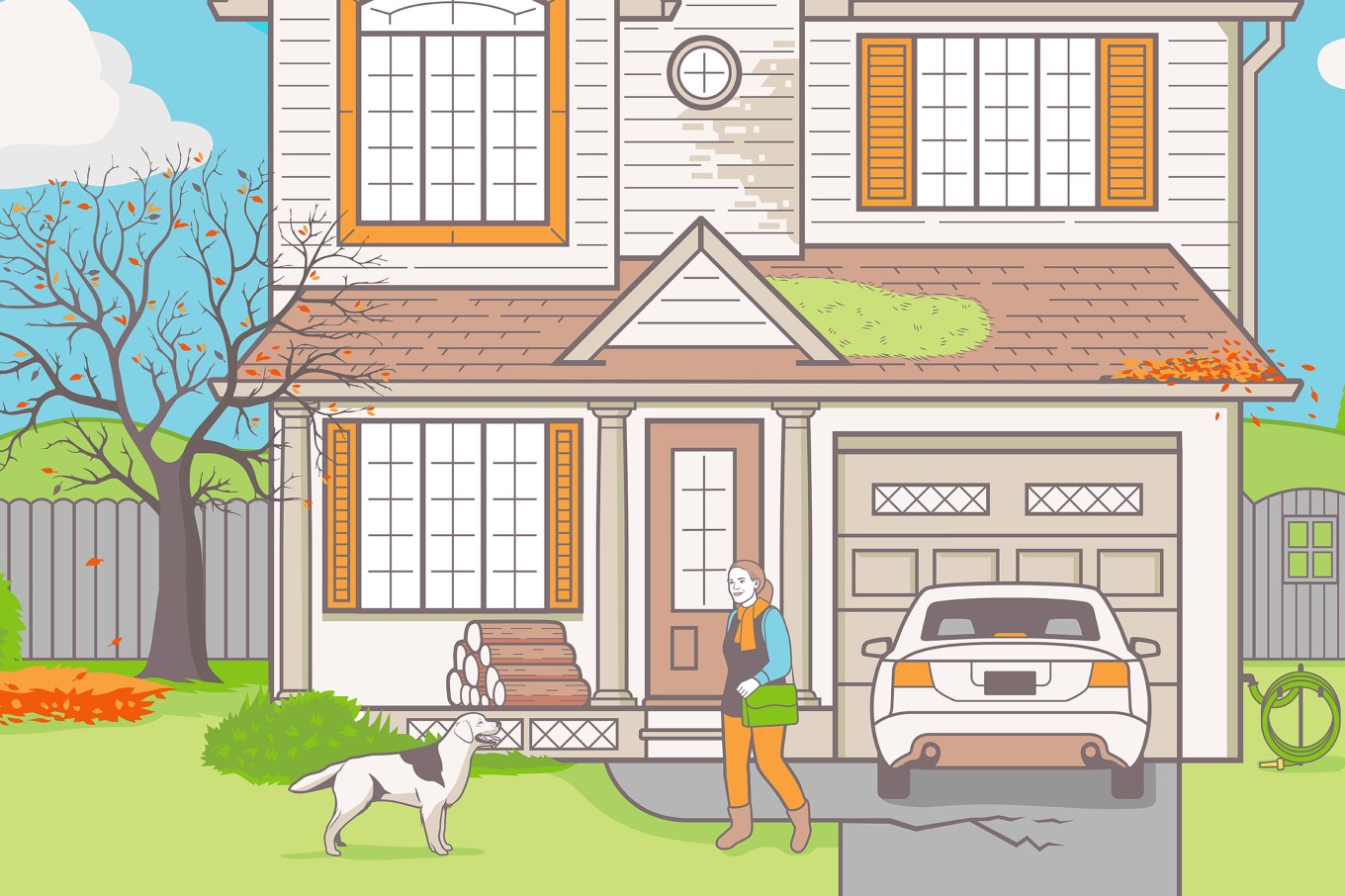You’ve closed on your first home. You got your keys. You got your rose-colored glasses. When you’re a new homeowner, excitement, optimism, and simply not-knowing-what you-don’t-know can make you look right past big problems in plain sight.
Discover some advice for new homeowners with this illustration of a home that has nine maintenance problems. Can you spot all nine?
Find out if you’re right. Here are the answers:
#1 Tree Limbs Leaning Over the House
Yes, trees are lovely and shady, and they keep your house out of the sun. But they can also break off in a storm and fall on your house faster than you can say, “Hello, insurance company, there’s a hole in my roof!”
Those limbs can be a highway into your home for pests like raccoons and squirrels who might end up nesting in your attic or gnawing electrical wires. So keep limbs trimmed at least six feet above the house.
#2 Overgrown Grass
Holy moly, who knew grass grows so quickly?! But putting off mowing because you can’t find the time or don’t have a mower yet can come back to bite you.
Long grass makes a great hiding place for rodents, who will hang there until they get a chance to scurry into your house. When the lawn mower’s away, the mice will play — and you risk a city fine for overgrowth. Avoid the risk, and just whack that grass.
#3 Flaking Paint
Paint on your home’s wood or stucco siding is the deflector shield of your house. If it’s flaking, there are holes in your shield, and that’s a problem. It lets in moisture that can rot the bones of your home. A little water turns into big trouble, fast. The more water that seeps in through those cracks, the bigger the cracks get, letting in even more water.
So paint. Pronto.
#4 Wood Pile Near the House
You’ve got your entire winter supply of firewood stacked right up against the house, so you’ll never have to schlep wood in single-digit temps again. But. That woodpile can be a cozy winter home to a who’s who of unwelcome critters like mice, termites, and cockroaches.
Firewood storage outside should be at least 20 feet from your house. You can still keep a few logs near the door — just enough for a night or two. That way, your firewood stays handy, and the creepy crawlies don’t have time to move in.
#5 Parking on the Grass
You’re house-proud, so you have your friends over all the time. But if you let them park on the lawn (your house, your rules, right?), the vehicles will sink into the yard, compact the soil, and crush the grass.
Crushed grass becomes dead grass; weeds sprout in the dead spots; and soon your dying, weedy, tire-rutted yard starts chipping away at your house pride (and your home value).
If you need more parking, expand your driveway. That’s better for curb appeal than a dead lawn.
#6 Moss on the Roof or Siding
Yes, it’s pretty and gives your house an enchanted-cottage look, but it will inflict damage to your home that will cost a small fortune to repair. Moss stores rainwater, causing mold to grow on the roof where it will seep into the wood beneath the shingles, into the attic, and then on indoor walls. Mold in your house = an allergy nightmare.
All that moisture will rot your roof, too. Same with mossy siding: water damage and mold await. Scrape that moss off as soon as you see it.
To prevent it from coming back, put zinc or copper flashing at the roof’s peak. Rain dissolves a bit of the metal every time it falls, and it kills moss when it washes over the roof. To get moss off siding, use a power washer.
#7 Debris In Gutters
Clean out those gutters. It probably won’t be the high point of your weekend, but it’s worth it.
When your gutters are full of leaves, sticks, and other gunk, they’ll overflow when it rains, pouring water on the fascia and soffit (the parts of your house under the eave), eroding landscaping, or even making your roof leak.
Clean-gutter bonus: You’ll have fewer mosquitoes, who lay eggs in the water in clogged gutters. So clean them. Or hire someone to do it.
#8 Cracks in the Driveway
Melted snow will seep into driveway cracks, then freeze, expand, and make the cracks even bigger. That ice can even push up chunks of concrete, leaving you with a driveway disaster. In the fall, patch cracks with concrete to keep winter water out. Asphalt driveway? There are products to patch that, too.
#9 Leaves Left on the Lawn
When you’ve put the mower away for the year and snow’s just going to cover your lawn in a month anyway, why bother with the leaves?
Your lawn may be done growing for the year, but its roots are alive and well. Leaving leaves on top of it can smother the grass and cause mildew, which will kill your yard. Then when spring comes, your lawn will stay brown.
To avoid this, rake up the leaves in the fall. Or, if there’s not an overwhelming amount, just run the mover over them. Collect them in your mower’s bag, or let the tiny bits mulch your lawn.
